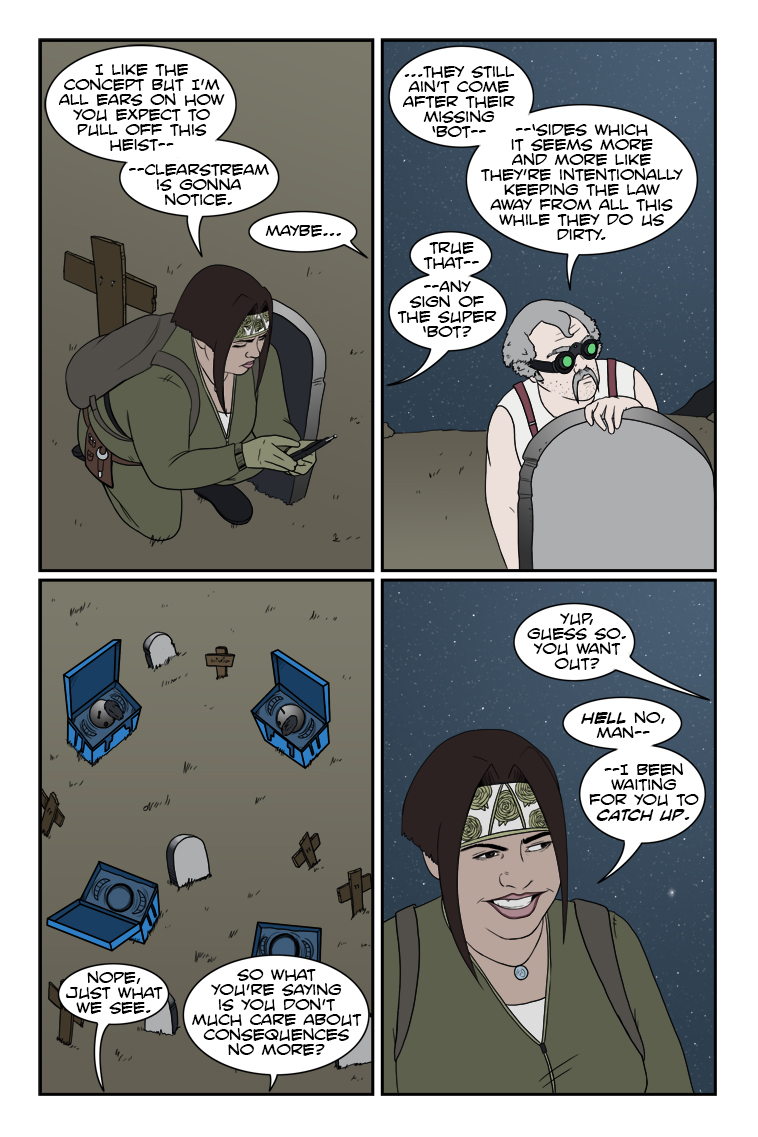Cart
Product categories
Support Us!
If you like what I do please support us on Ko-fi or Patreon.
Follow Us!
Join Our Newsletter!
Vote For Us!
Login
Polls
Events
-
Pasadena Comic Con
Dates: May 24
Location: Pasadena Convention Center, 300 E Green St, Pasadena, CA 91101, USA ( MAP)Details:We will be at the Pasadena Comic Con on January 26th. See some of you there for this one day event!
Purchase tickets online at here: https://www.tixr.com/groups/pcc/events/pasadenacomiccon-pasadena-comic-con-2025-115248
-
San Diego Comic Con: SP-N7
Dates: Jul 23 - 27
Location: San Diego Convention Center, 111 Harbor Dr, San Diego, CA 92101, USA ( MAP)Details:Clint & Dawn Wolf will be at San Diego Comic Con, as Lab Reject Studios. We will be at booth N7 in Small Press.









6 thoughts on “542 – Catching Up”
Keith
Some friction, but yeah. IRL, I’d like these two…they should have kids. 😉
Dawn
I might have to draw out what their kid would look like. First thought is that their kid would look like Ongo Gablogian from “It’s Always Sunny In Philadelphia”
Scarsdale
He’s pushing 60, she’s maybe 30, more likely less. Chuck is most likely shooting blanks, and besides, he’s talking to her like a baby sister than a love interest.
ConcordBob
It is really hard to have a favorite character, as there are so many good ones. But I think Rosa is my favorite. Chuck is a good accomplice in sneaking work, but not much for romance. Uugh.
Otaku
I mean, if they don’t have at least an inkling of what’s going down, I’m actually disappointed in Clearstream. If anything, I’m starting to wonder if they caught on and realized “Wait, we can use this.”
Because of course they can. 😉
Dr. Norman (not a real doctor)
I’m way ahead of you – I’ve been waiting for you to catch up. From November 2020:
I would hope for nothing less – her and Chuck have the potential for a great deal of positive mischief.
Speaking of which, I received the email notifying me that my order for the NSFW “Chuck and Rosa Finally Do It” (age verification required) limited edition hardcover is going to be delayed due to the pandemic. I think it’s really cool that you’ll be adding some additional stretch goal goodies when it ships – thanks for all your story and art.
As for the inscription, ” We owe it all to you ” will be sufficient.
Latest Comics
#404. 388 – One-Word Wonders
37 Sep 12, 2018
#403. 387 – Shaken, Unstirred
35 Sep 05, 2018
#402. 386 – Need To No
32 Aug 29, 2018
#401. 385 – A Frank Interrogation
34 Aug 22, 2018
#400. 384 – Conversation Peace
35 Jul 11, 2018
#399. 383 – Reductive Reasoning
35 Jul 04, 2018
#398. 382 – Focused Inquiry
35 Jun 27, 2018
#397. 381 – In Hooch Veritas
36 Jun 20, 2018
#396. 380 – Rat In The Hole
27 Jun 13, 2018
#395. 379 – Zulu India
30 Jun 06, 2018
#394. 378 – Me Myself And Eyeball
27 May 30, 2018
#393. 377 – Temperature Rising
26 May 23, 2018
#392. 376 – Hot Stuff
25 May 09, 2018
#391. 375 – [Title Drop]
23 May 02, 2018
#390. 374 – [Credits Intensify]
27 Apr 25, 2018
#389. 373 – [Zombie Ranch Theme Plays]
47 Apr 18, 2018
#388. 372 – Fire And Ice
45 Apr 11, 2018
#387. EPISODE SIXTEEN
56 Apr 09, 2018
#386. 371 – The Small Picture (END OF EPISODE 15)
50 Mar 14, 2018
#385. 370 – She Do Declare
48 Mar 07, 2018
Latest Chapters
Episode 22
Episode 21
Episode 20
Episode 19
Episode 18
Episode 17
542 – Catching Up
Now you're getting the idea, Chuck!
A city for the “century”
Calendar
BlueSky Latest Posts
Writer’s Blog Archives